- Home
- Henry James
The Portrait of a Lady — Volume 1
The Portrait of a Lady — Volume 1 Read online
Produced by Eve Sobol
THE PORTRAIT OF A LADY
VOLUME I
By Henry James
PREFACE
"The Portrait of a Lady" was, like "Roderick Hudson," begun in Florence,during three months spent there in the spring of 1879. Like "Roderick"and like "The American," it had been designed for publication in "TheAtlantic Monthly," where it began to appear in 1880. It differed fromits two predecessors, however, in finding a course also open to it, frommonth to month, in "Macmillan's Magazine"; which was to be for me one ofthe last occasions of simultaneous "serialisation" in the two countriesthat the changing conditions of literary intercourse between England andthe United States had up to then left unaltered. It is a long novel, andI was long in writing it; I remember being again much occupied with it,the following year, during a stay of several weeks made in Venice. I hadrooms on Riva Schiavoni, at the top of a house near the passage leadingoff to San Zaccaria; the waterside life, the wondrous lagoon spreadbefore me, and the ceaseless human chatter of Venice came in at mywindows, to which I seem to myself to have been constantly driven, inthe fruitless fidget of composition, as if to see whether, out in theblue channel, the ship of some right suggestion, of some better phrase,of the next happy twist of my subject, the next true touch for mycanvas, mightn't come into sight. But I recall vividly enough that theresponse most elicited, in general, to these restless appeals was therather grim admonition that romantic and historic sites, such asthe land of Italy abounds in, offer the artist a questionable aid toconcentration when they themselves are not to be the subject of it. Theyare too rich in their own life and too charged with their own meaningsmerely to help him out with a lame phrase; they draw him away from hissmall question to their own greater ones; so that, after a little, hefeels, while thus yearning toward them in his difficulty, as if he wereasking an army of glorious veterans to help him to arrest a peddler whohas given him the wrong change.
There are pages of the book which, in the reading over, have seemedto make me see again the bristling curve of the wide Riva, the largecolour-spots of the balconied houses and the repeated undulation of thelittle hunchbacked bridges, marked by the rise and drop again, with thewave, of foreshortened clicking pedestrians. The Venetian footfall andthe Venetian cry--all talk there, wherever uttered, having the pitch ofa call across the water--come in once more at the window, renewing one'sold impression of the delighted senses and the divided, frustrated mind.How can places that speak IN GENERAL so to the imagination not giveit, at the moment, the particular thing it wants? I recollect againand again, in beautiful places, dropping into that wonderment. Thereal truth is, I think, that they express, under this appeal, only toomuch--more than, in the given case, one has use for; so that onefinds one's self working less congruously, after all, so far as thesurrounding picture is concerned, than in presence of the moderate andthe neutral, to which we may lend something of the light of our vision.Such a place as Venice is too proud for such charities; Venice doesn'tborrow, she but all magnificently gives. We profit by that enormously,but to do so we must either be quite off duty or be on it in her servicealone. Such, and so rueful, are these reminiscences; though on thewhole, no doubt, one's book, and one's "literary effort" at large, wereto be the better for them. Strangely fertilising, in the long run, doesa wasted effort of attention often prove. It all depends on HOW theattention has been cheated, has been squandered. There are high-handedinsolent frauds, and there are insidious sneaking ones. And there is,I fear, even on the most designing artist's part, always witless enoughgood faith, always anxious enough desire, to fail to guard him againsttheir deceits.
Trying to recover here, for recognition, the germ of my idea, I see thatit must have consisted not at all in any conceit of a "plot," nefariousname, in any flash, upon the fancy, of a set of relations, or in any oneof those situations that, by a logic of their own, immediately fall, forthe fabulist, into movement, into a march or a rush, a patter of quicksteps; but altogether in the sense of a single character, the characterand aspect of a particular engaging young woman, to which all the usualelements of a "subject," certainly of a setting, were to need to besuper added. Quite as interesting as the young woman herself at herbest, do I find, I must again repeat, this projection of memory upon thewhole matter of the growth, in one's imagination, of some such apologyfor a motive. These are the fascinations of the fabulist's art, theselurking forces of expansion, these necessities of upspringing inthe seed, these beautiful determinations, on the part of the ideaentertained, to grow as tall as possible, to push into the light andthe air and thickly flower there; and, quite as much, these finepossibilities of recovering, from some good standpoint on the groundgained, the intimate history of the business--of retracing andreconstructing its steps and stages. I have always fondly remembered aremark that I heard fall years ago from the lips of Ivan Turgenieff inregard to his own experience of the usual origin of the fictive picture.It began for him almost always with the vision of some person orpersons, who hovered before him, soliciting him, as the active orpassive figure, interesting him and appealing to him just as they wereand by what they were. He saw them, in that fashion, as disponibles,saw them subject to the chances, the complications of existence, and sawthem vividly, but then had to find for them the right relations, thosethat would most bring them out; to imagine, to invent and select andpiece together the situations most useful and favourable to the sense ofthe creatures themselves, the complications they would be most likely toproduce and to feel.
"To arrive at these things is to arrive at my story," he said, "andthat's the way I look for it. The result is that I'm often accusedof not having 'story' enough. I seem to myself to have as much as Ineed--to show my people, to exhibit their relations with each other;for that is all my measure. If I watch them long enough I see them cometogether, I see them PLACED, I see them engaged in this or that act andin this or that difficulty. How they look and move and speak and behave,always in the setting I have found for them, is my account of them--ofwhich I dare say, alas, que cela manque souvent d'architecture. But Iwould rather, I think, have too little architecture than too much--whenthere's danger of its interfering with my measure of the truth. TheFrench of course like more of it than I give--having by their own geniussuch a hand for it; and indeed one must give all one can. As for theorigin of one's wind-blown germs themselves, who shall say, as you ask,where THEY come from? We have to go too far back, too far behind,to say. Isn't it all we can say that they come from every quarterof heaven, that they are THERE at almost any turn of the road? Theyaccumulate, and we are always picking them over, selecting among them.They are the breath of life--by which I mean that life, in its ownway, breathes them upon us. They are so, in a manner prescribed andimposed--floated into our minds by the current of life. That reduces toimbecility the vain critic's quarrel, so often, with one's subject, whenhe hasn't the wit to accept it. Will he point out then which other itshould properly have been?--his office being, essentially to point out.Il en serait bien embarrasse. Ah, when he points out what I've done orfailed to do with it, that's another matter: there he's on his ground. Igive him up my 'sarchitecture,'" my distinguished friend concluded, "asmuch as he will."
So this beautiful genius, and I recall with comfort the gratitude I drewfrom his reference to the intensity of suggestion that may reside in thestray figure, the unattached character, the image en disponibilite.It gave me higher warrant than I seemed then to have met for justthat blest habit of one's own imagination, the trick of investing someconceived or encountered individual, some brace or group of individuals,with the germinal property and authority. I was myself so much moreantecedently conscious of my figures than of their setting--a
toopreliminary, a preferential interest in which struck me as in generalsuch a putting of the cart before the horse. I might envy, though Icouldn't emulate, the imaginative writer so constituted as to see hisfable first and to make out its agents afterwards. I could think solittle of any fable that didn't need its agents positively to launchit; I could think so little of any situation that didn't depend for itsinterest on the nature of the persons situated, and thereby on theirway of taking it. There are methods of so-called presentation, I believeamong novelists who have appeared to flourish--that offer the situationas indifferent to that support; but I have not lost the sense of thevalue for me, at the time, of the admirable Russian's testimony to mynot needing, all superstitiously, to try and perform any such gymnastic.Other echoes from the same source linger with me, I confess, asunfadingly--if it be not all indeed one much-embracing echo. It wasimpossible after that not to read, for one's uses, high lucidity intothe tormented and disfigured and bemuddled question of the objectivevalue, and even quite into that of the critical appreciation, of"subject" in the novel.
One had had from an early time, for that matter, the instinct of theright estimate of such values and of its reducing to the inane thedull dispute over the "immoral" subject and the moral. Recognising sopromptly the one measure of the worth of a given subject, the questionabout it that, rightly answered, disposes of all others--is it valid,in a word, is it genuine, is it sincere, the result of some directimpression or perception of life?--I had found small edification,mostly, in a critical pretension that had neglected from the firstall delimitation of ground and all definition of terms. The air ofmy earlier time shows, to memory, as darkened, all round, with thatvanity--unless the difference to-day be just in one's own finalimpatience, the lapse of one's attention. There is, I think, no morenutritive or suggestive truth in this connexion than that of the perfectdependence of the "moral" sense of a work of art on the amount of feltlife concerned in producing it. The question comes back thus, obviously,to the kind and the degree of the artist's prime sensibility, which isthe soil out of which his subject springs. The quality and capacity ofthat soil, its ability to "grow" with due freshness and straightness anyvision of life, represents, strongly or weakly, the projected morality.That element is but another name for the more or less close connexion ofthe subject with some mark made on the intelligence, with some sincereexperience. By which, at the same time, of course, one is far fromcontending that this enveloping air of the artist's humanity--whichgives the last touch to the worth of the work--is not a widely andwondrously varying element; being on one occasion a rich and magnificentmedium and on another a comparatively poor and ungenerous one. Here weget exactly the high price of the novel as a literary form--its powernot only, while preserving that form with closeness, to rangethrough all the differences of the individual relation to its generalsubject-matter, all the varieties of outlook on life, of disposition toreflect and project, created by conditions that are never the same fromman to man (or, so far as that goes, from man to woman), but positivelyto appear more true to its character in proportion as it strains, ortends to burst, with a latent extravagance, its mould.
The house of fiction has in short not one window, but a million--anumber of possible windows not to be reckoned, rather; every one ofwhich has been pierced, or is still pierceable, in its vast front, bythe need of the individual vision and by the pressure of the individualwill. These apertures, of dissimilar shape and size, hang so, alltogether, over the human scene that we might have expected of them agreater sameness of report than we find. They are but windows at thebest, mere holes in a dead wall, disconnected, perched aloft; they arenot hinged doors opening straight upon life. But they have this mark oftheir own that at each of them stands a figure with a pair of eyes,or at least with a field-glass, which forms, again and again, forobservation, a unique instrument, insuring to the person making use ofit an impression distinct from every other. He and his neighbours arewatching the same show, but one seeing more where the other sees less,one seeing black where the other sees white, one seeing big where theother sees small, one seeing coarse where the other sees fine. Andso on, and so on there is fortunately no saying on what, for theparticular pair of eyes, the window may NOT open; "fortunately" byreason, precisely, of this incalculability of range. The spreadingfield, the human scene, is the "choice of subject"; the piercedaperture, either broad or balconied or slit-like and low-browed, is the"literary form"; but they are, singly or together, as nothing withoutthe posted presence of the watcher--without, in other words, theconsciousness of the artist. Tell me what the artist is, and I will tellyou of what he has BEEN conscious. Thereby I shall express to you atonce his boundless freedom and his "moral" reference.
All this is a long way round, however, for my word about my dim firstmove toward "The Portrait," which was exactly my grasp of a singlecharacter--an acquisition I had made, moreover, after a fashion nothere to be retraced. Enough that I was, as seemed to me, in completepossession of it, that I had been so for a long time, that this had madeit familiar and yet had not blurred its charm, and that, all urgently,all tormentingly, I saw it in motion and, so to speak, in transit. Thisamounts to saying that I saw it as bent upon its fate--some fate orother; which, among the possibilities, being precisely the question.Thus I had my vivid individual--vivid, so strangely, in spite of beingstill at large, not confined by the conditions, not engaged in thetangle, to which we look for much of the impress that constitutes anidentity. If the apparition was still all to be placed how came it tobe vivid?--since we puzzle such quantities out, mostly, just by thebusiness of placing them. One could answer such a question beautifully,doubtless, if one could do so subtle, if not so monstrous, a thing as towrite the history of the growth of one's imagination. One would describethen what, at a given time, had extraordinarily happened to it, and onewould so, for instance, be in a position to tell, with an approach toclearness, how, under favour of occasion, it had been able to take over(take over straight from life) such and such a constituted, animatedfigure or form. The figure has to that extent, as you see, BEENplaced--placed in the imagination that detains it, preserves,protects, enjoys it, conscious of its presence in the dusky, crowded,heterogeneous back-shop of the mind very much as a wary dealer inprecious odds and ends, competent to make an "advance" on rare objectsconfided to him, is conscious of the rare little "piece" left in depositby the reduced, mysterious lady of title or the speculative amateur,and which is already there to disclose its merit afresh as soon as a keyshall have clicked in a cupboard-door.
That may he, I recognise, a somewhat superfine analogy for theparticular "value" I here speak of, the image of the young femininenature that I had had for so considerable a time all curiously at mydisposal; but it appears to fond memory quite to fit the fact--with therecall, in addition, of my pious desire but to place my treasure right.I quite remind myself thus of the dealer resigned not to "realise,"resigned to keeping the precious object locked up indefinitely ratherthan commit it, at no matter what price, to vulgar hands. For thereARE dealers in these forms and figures and treasures capable of thatrefinement. The point is, however, that this single small corner-stone,the conception of a certain young woman affronting her destiny, hadbegun with being all my outfit for the large building of "The Portraitof a Lady." It came to be a square and spacious house--or has at leastseemed so to me in this going over it again; but, such as it is, ithad to be put up round my young woman while she stood there in perfectisolation. That is to me, artistically speaking, the circumstance ofinterest; for I have lost myself once more, I confess, in the curiosityof analysing the structure. By what process of logical accretion wasthis slight "personality," the mere slim shade of an intelligent butpresumptuous girl, to find itself endowed with the high attributes of aSubject?--and indeed by what thinness, at the best, would such a subjectnot be vitiated? Millions of presumptuous girls, intelligent or notintelligent, daily affront their destiny, and what is it open to theirdestiny to be, at the most, that we should make an ado abo
ut it? Thenovel is of its very nature an "ado," an ado about something, and thelarger the form it takes the greater of course the ado. Therefore,consciously, that was what one was in for--for positively organising anado about Isabel Archer.
One looked it well in the face, I seem to remember, this extravagance;and with the effect precisely of recognising the charm of the problem.Challenge any such problem with any intelligence, and you immediatelysee how full it is of substance; the wonder being, all the while, as welook at the world, how absolutely, how inordinately, the Isabel Archers,and even much smaller female fry, insist on mattering. George Eliot hasadmirably noted it--"In these frail vessels is borne onward through theages the treasure of human affection." In "Romeo and Juliet" Juliet hasto be important, just as, in "Adam Bede" and "The Mill on the Floss" and"Middlemarch" and "Daniel Deronda," Hetty Sorrel and Maggie Tulliver andRosamond Vincy and Gwendolen Harleth have to be; with that much of firmground, that much of bracing air, at the disposal all the while oftheir feet and their lungs. They are typical, none the less, of a classdifficult, in the individual case, to make a centre of interest; sodifficult in fact that many an expert painter, as for instance Dickensand Walter Scott, as for instance even, in the main, so subtle a handas that of R. L. Stevenson, has preferred to leave the task unattempted.There are in fact writers as to whom we make out that their refugefrom this is to assume it to be not worth their attempting; by whichpusillanimity in truth their honour is scantly saved. It is never anattestation of a value, or even of our imperfect sense of one, it isnever a tribute to any truth at all, that we shall represent that valuebadly. It never makes up, artistically, for an artist's dim feelingabout a thing that he shall "do" the thing as ill as possible. There arebetter ways than that, the best of all of which is to begin with lessstupidity.
It may be answered meanwhile, in regard to Shakespeare's and to GeorgeEliot's testimony, that their concession to the "importance" of theirJuliets and Cleopatras and Portias (even with Portia as the very typeand model of the young person intelligent and presumptuous) and to thatof their Hettys and Maggies and Rosamonds and Gwendolens, suffers theabatement that these slimnesses are, when figuring as the main props ofthe theme, never suffered to be sole ministers of its appeal, but havetheir inadequacy eked out with comic relief and underplots, as theplaywrights say, when not with murders and battles and the greatmutations of the world. If they are shown as "mattering" as much asthey could possibly pretend to, the proof of it is in a hundred otherpersons, made of much stouter stuff; and each involved moreover in ahundred relations which matter to THEM concomitantly with that one.Cleopatra matters, beyond bounds, to Antony, but his colleagues,his antagonists, the state of Rome and the impending battle alsoprodigiously matter; Portia matters to Antonio, and to Shylock, andto the Prince of Morocco, to the fifty aspiring princes, but for thesegentry there are other lively concerns; for Antonio, notably, thereare Shylock and Bassanio and his lost ventures and the extremity ofhis predicament. This extremity indeed, by the same token, matters toPortia--though its doing so becomes of interest all by the fact thatPortia matters to US. That she does so, at any rate, and that almosteverything comes round to it again, supports my contention as to thisfine example of the value recognised in the mere young thing. (I say"mere" young thing because I guess that even Shakespeare, preoccupiedmainly though he may have been with the passions of princes, wouldscarce have pretended to found the best of his appeal for her on herhigh social position.) It is an example exactly of the deep difficultybraved--the difficulty of making George Eliot's "frail vessel," if notthe all-in-all for our attention, at least the clearest of the call.
Now to see deep difficulty braved is at any time, for the reallyaddicted artist, to feel almost even as a pang the beautiful incentive,and to feel it verily in such sort as to wish the danger intensified.The difficulty most worth tackling can only be for him, in theseconditions, the greatest the case permits of. So I remember feelinghere (in presence, always, that is, of the particular uncertainty of myground), that there would be one way better than another--oh, ever somuch better than any other!--of making it fight out its battle. Thefrail vessel, that charged with George Eliot's "treasure," and therebyof such importance to those who curiously approach it, has likewisepossibilities of importance to itself, possibilities which permit oftreatment and in fact peculiarly require it from the moment they areconsidered at all. There is always the escape from any close accountof the weak agent of such spells by using as a bridge for evasion, forretreat and flight, the view of her relation to those surrounding her.Make it predominantly a view of THEIR relation and the trick is played:you give the general sense of her effect, and you give it, so far as theraising on it of a superstructure goes, with the maximum of ease. Well,I recall perfectly how little, in my now quite established connexion,the maximum of ease appealed to me, and how I seemed to get rid of itby an honest transposition of the weights in the two scales. "Place thecentre of the subject in the young woman's own consciousness," I said tomyself, "and you get as interesting and as beautiful a difficulty as youcould wish. Stick to THAT--for the centre; put the heaviest weightinto THAT scale, which will be so largely the scale of her relationto herself. Make her only interested enough, at the same time, in thethings that are not herself, and this relation needn't fear to be toolimited. Place meanwhile in the other scale the lighter weight (which isusually the one that tips the balance of interest): press least hard, inshort, on the consciousness of your heroine's satellites, especially themale; make it an interest contributive only to the greater one. See, atall events, what can be done in this way. What better field could therebe for a due ingenuity? The girl hovers, inextinguishable, as a charmingcreature, and the job will be to translate her into the highest termsof that formula, and as nearly as possible moreover into ALL of them. Todepend upon her and her little concerns wholly to see you through willnecessitate, remember, your really 'doing' her."
So far I reasoned, and it took nothing less than that technical rigour,I now easily see, to inspire me with the right confidence for erectingon such a plot of ground the neat and careful and proportioned pile ofbricks that arches over it and that was thus to form, constructionallyspeaking, a literary monument. Such is the aspect that to-day "ThePortrait" wears for me: a structure reared with an "architectural"competence, as Turgenieff would have said, that makes it, to theauthor's own sense, the most proportioned of his productions after "TheAmbassadors" which was to follow it so many years later and which has,no doubt, a superior roundness. On one thing I was determined; that,though I should clearly have to pile brick upon brick for the creationof an interest, I would leave no pretext for saying that anything isout of line, scale or perspective. I would build large--in fine embossedvaults and painted arches, as who should say, and yet never let itappear that the chequered pavement, the ground under the reader'sfeet, fails to stretch at every point to the base of the walls. Thatprecautionary spirit, on re-perusal of the book, is the old note thatmost touches me: it testifies so, for my own ear, to the anxiety of myprovision for the reader's amusement. I felt, in view of the possiblelimitations of my subject, that no such provision could be excessive,and the development of the latter was simply the general form of thatearnest quest. And I find indeed that this is the only account I cangive myself of the evolution of the fable it is all under the head thusnamed that I conceive the needful accretion as having taken place, theright complications as having started. It was naturally of the essencethat the young woman should be herself complex; that was rudimentary--orwas at any rate the light in which Isabel Archer had originally dawned.It went, however, but a certain way, and other lights, contending,conflicting lights, and of as many different colours, if possible, asthe rockets, the Roman candles and Catherine-wheels of a "pyrotechnicdisplay," would be employable to attest that she was. I had, no doubt, agroping instinct for the right complications, since I am quite unableto track the footsteps of those that constitute, as the case stands, thegeneral situation exhibited. They are there, for what
they are worth,and as numerous as might be; but my memory, I confess, is a blank as tohow and whence they came.
I seem to myself to have waked up one morning in possession of them--ofRalph Touchett and his parents, of Madame Merle, of Gilbert Osmond andhis daughter and his sister, of Lord Warburton, Caspar Goodwood andMiss Stackpole, the definite array of contributions to Isabel Archer'shistory. I recognised them, I knew them, they were the numbered piecesof my puzzle, the concrete terms of my "plot." It was as if they hadsimply, by an impulse of their own, floated into my ken, and all inresponse to my primary question: "Well, what will she DO?" Their answerseemed to be that if I would trust them they would show me; on which,with an urgent appeal to them to make it at least as interesting asthey could, I trusted them. They were like the group of attendants andentertainers who come down by train when people in the country give aparty; they represented the contract for carrying the party on. That wasan excellent relation with them--a possible one even with so broken areed (from her slightness of cohesion) as Henrietta Stackpole. It is afamiliar truth to the novelist, at the strenuous hour, that, as certainelements in any work are of the essence, so others are only of theform; that as this or that character, this or that disposition of thematerial, belongs to the subject directly, so to speak, so this or thatother belongs to it but indirectly--belongs intimately to the treatment.This is a truth, however, of which he rarely gets the benefit--since itcould be assured to him, really, but by criticism based upon perception,criticism which is too little of this world. He must not think ofbenefits, moreover, I freely recognise, for that way dishonour lies:he has, that is, but one to think of--the benefit, whatever it may be,involved in his having cast a spell upon the simpler, the very simplest,forms of attention. This is all he is entitled to; he is entitled tonothing, he is bound to admit, that can come to him, from the reader, asa result on the latter's part of any act of reflexion or discrimination.He may ENJOY this finer tribute--that is another affair, but oncondition only of taking it as a gratuity "thrown in," a mere miraculouswindfall, the fruit of a tree he may not pretend to have shaken. Againstreflexion, against discrimination, in his interest, all earth and airconspire; wherefore it is that, as I say, he must in many a case haveschooled himself, from the first, to work but for a "living wage." Theliving wage is the reader's grant of the least possible quantity ofattention required for consciousness of a "spell." The occasionalcharming "tip" is an act of his intelligence over and beyond this, agolden apple, for the writer's lap, straight from the wind-stirred tree.The artist may of course, in wanton moods, dream of some Paradise (forart) where the direct appeal to the intelligence might be legalised; forto such extravagances as these his yearning mind can scarce hope evercompletely to close itself. The most he can do is to remember they AREextravagances.
All of which is perhaps but a gracefully devious way of saying thatHenrietta Stackpole was a good example, in "The Portrait," of the truthto which I just adverted--as good an example as I could name were it notthat Maria Gostrey, in "The Ambassadors," then in the bosom of time,may be mentioned as a better. Each of these persons is but wheels to thecoach; neither belongs to the body of that vehicle, or is for a momentaccommodated with a seat inside. There the subject alone is ensconced,in the form of its "hero and heroine," and of the privileged highofficials, say, who ride with the king and queen. There are reasonswhy one would have liked this to be felt, as in general one would likealmost anything to be felt, in one's work, that one has one's selfcontributively felt. We have seen, however, how idle is that pretension,which I should be sorry to make too much of. Maria Gostrey and MissStackpole then are cases, each, of the light ficelle, not of the trueagent; they may run beside the coach "for all they are worth," they maycling to it till they are out of breath (as poor Miss Stackpole all sovisibly does), but neither, all the while, so much as gets her foot onthe step, neither ceases for a moment to tread the dusty road. Put iteven that they are like the fishwives who helped to bring back to Parisfrom Versailles, on that most ominous day of the first half of theFrench Revolution, the carriage of the royal family. The only thingis that I may well be asked, I acknowledge, why then, in the presentfiction, I have suffered Henrietta (of whom we have indubitably toomuch) so officiously, so strangely, so almost inexplicably, to pervade.I will presently say what I can for that anomaly--and in the mostconciliatory fashion.
A point I wish still more to make is that if my relation of confidencewith the actors in my drama who WERE, unlike Miss Stackpole, trueagents, was an excellent one to have arrived at, there still remained myrelation with the reader, which was another affair altogether and as towhich I felt no one to be trusted but myself. That solicitude was to beaccordingly expressed in the artful patience with which, as I havesaid, I piled brick upon brick. The bricks, for the wholecounting-over--putting for bricks little touches and inventions andenhancements by the way--affect me in truth as well-nigh innumerable andas ever so scrupulously fitted together and packed-in. It is an effectof detail, of the minutest; though, if one were in this connexion to sayall, one would express the hope that the general, the ampler air of themodest monument still survives. I do at least seem to catch the key toa part of this abundance of small anxious, ingenious illustration as Irecollect putting my finger, in my young woman's interest, on the mostobvious of her predicates. "What will she 'do'? Why, the first thingshe'll do will be to come to Europe; which in fact will form, and allinevitably, no small part of her principal adventure. Coming toEurope is even for the 'frail vessels,' in this wonderful age, a mildadventure; but what is truer than that on one side--the side of theirindependence of flood and field, of the moving accident, of battle andmurder and sudden death--her adventures are to be mild? Without hersense of them, her sense FOR them, as one may say, they are next tonothing at all; but isn't the beauty and the difficulty just in showingtheir mystic conversion by that sense, conversion into the stuff ofdrama or, even more delightful word still, of 'story'?" It was allas clear, my contention, as a silver bell. Two very good instances, Ithink, of this effect of conversion, two cases of the rare chemistry,are the pages in which Isabel, coming into the drawing-room atGardencourt, coming in from a wet walk or whatever, that rainyafternoon, finds Madame Merle in possession of the place, MadameMerle seated, all absorbed but all serene, at the piano, and deeplyrecognises, in the striking of such an hour, in the presence there,among the gathering shades, of this personage, of whom a moment beforeshe had never so much as heard, a turning-point in her life. It isdreadful to have too much, for any artistic demonstration, to dot one'si's and insist on one's intentions, and I am not eager to do it now; butthe question here was that of producing the maximum of intensity withthe minimum of strain.
The interest was to be raised to its pitch and yet the elements to bekept in their key; so that, should the whole thing duly impress, I mightshow what an "exciting" inward life may do for the person leading iteven while it remains perfectly normal. And I cannot think of a moreconsistent application of that ideal unless it be in the long statement,just beyond the middle of the book, of my young woman's extraordinarymeditative vigil on the occasion that was to become for her such alandmark. Reduced to its essence, it is but the vigil of searchingcriticism; but it throws the action further forward that twenty"incidents" might have done. It was designed to have all the vivacityof incidents and all the economy of picture. She sits up, by her dyingfire, far into the night, under the spell of recognitions on which shefinds the last sharpness suddenly wait. It is a representation simplyof her motionlessly SEEING, and an attempt withal to make the mere stilllucidity of her act as "interesting" as the surprise of a caravan or theidentification of a pirate. It represents, for that matter, one of theidentifications dear to the novelist, and even indispensable to him;but it all goes on without her being approached by another person andwithout her leaving her chair. It is obviously the best thing in thebook, but it is only a supreme illustration of the general plan. As toHenrietta, my apology for whom I just left incomplete, she exemplifies,I fea
r, in her superabundance, not an element of my plan, but onlyan excess of my zeal. So early was to begin my tendency to OVERTREAT,rather than undertreat (when there was choice or danger) my subject.(Many members of my craft, I gather, are far from agreeing with me, butI have always held overtreating the minor disservice.) "Treating" thatof "The Portrait" amounted to never forgetting, by any lapse, that thething was under a special obligation to be amusing. There was the dangerof the noted "thinness"--which was to be averted, tooth and nail,by cultivation of the lively. That is at least how I see it to-day.Henrietta must have been at that time a part of my wonderful notion ofthe lively. And then there was another matter. I had, within the fewpreceding years, come to live in London, and the "international" lightlay, in those days, to my sense, thick and rich upon the scene. It wasthe light in which so much of the picture hung. But that IS anothermatter. There is really too much to say.
HENRY JAMES
THE PORTRAIT OF A LADY

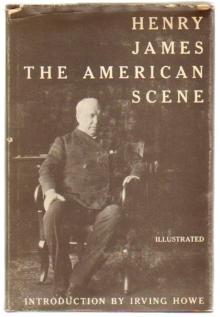 The American
The American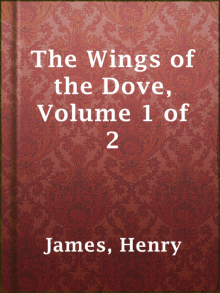 The Wings of the Dove, Volume 1 of 2
The Wings of the Dove, Volume 1 of 2 Frost at Midnight
Frost at Midnight Morning Frost
Morning Frost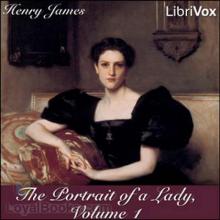 The Portrait of a Lady — Volume 1
The Portrait of a Lady — Volume 1 Fatal Frost
Fatal Frost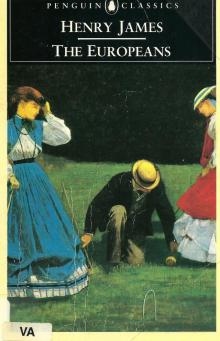 The Europeans
The Europeans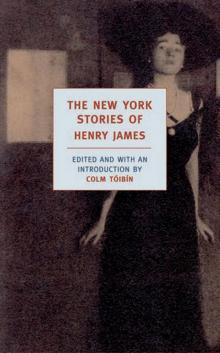 The New York Stories of Henry James
The New York Stories of Henry James Great Short Novels of Henry James
Great Short Novels of Henry James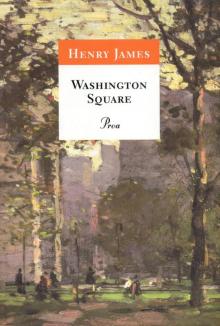 Washington Square
Washington Square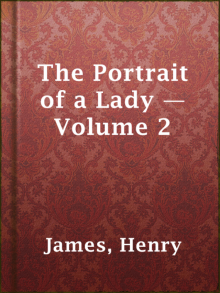 The Portrait of a Lady — Volume 2
The Portrait of a Lady — Volume 2 The Ambassadors
The Ambassadors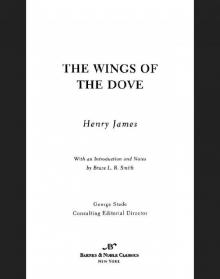 The Wings of the Dove
The Wings of the Dove The Princess Casamassima (Classics)
The Princess Casamassima (Classics) The Coxon Fund
The Coxon Fund First Frost
First Frost Henry James
Henry James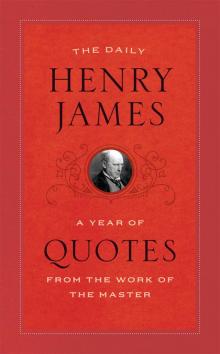 The Daily Henry James
The Daily Henry James Travels With Henry James
Travels With Henry James The Reverberator: A Novel
The Reverberator: A Novel What Maisie Knew (Henry James Collection)
What Maisie Knew (Henry James Collection)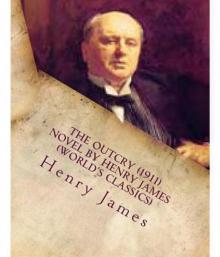 The Outcry
The Outcry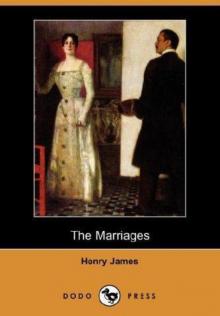 The Marriages
The Marriages The Wings of the Dove, Volume 2
The Wings of the Dove, Volume 2 The Bostonians, Vol. I
The Bostonians, Vol. I The Outcry: -1911
The Outcry: -1911 The Complete Works of Henry James
The Complete Works of Henry James Letters from the Palazzo Barbaro
Letters from the Palazzo Barbaro The Pupil
The Pupil The Bostonians, Vol. II
The Bostonians, Vol. II Pandora
Pandora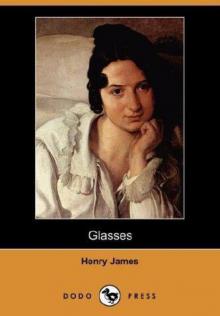 Glasses
Glasses The Princess Casamassima
The Princess Casamassima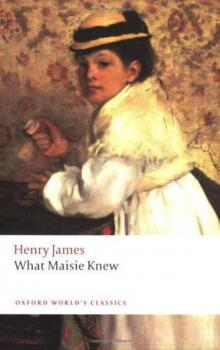 What Maisie Knew
What Maisie Knew The Reverberator
The Reverberator The Golden Bowl - Complete
The Golden Bowl - Complete Confidence
Confidence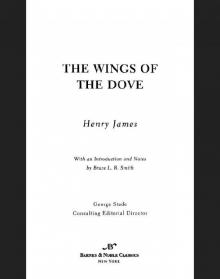 Wings of the Dove (Barnes & Noble Classics Series)
Wings of the Dove (Barnes & Noble Classics Series) The Spoils of Poynton
The Spoils of Poynton